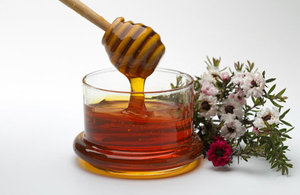GC contributes to European standard to combat food fraud
The Government Chemist team, and food fraud experts from the UK, have contributed to the standardisation of terminology related to food fraud

Manuka flowers: manuka honey is often a target for food fraud
Food fraud is a worldwide problem, with many countries committing considerable resource to combat the issue. The globalisation of the food supply chain has led to the acknowledgement that having agreed definitions for terms commonly associated with food authenticity and food fraud would be of great benefit.
The Norwegian Institute of Food, Fisheries and Aquaculture Research (Nofima), has led a European initiative aimed at making communications regarding food fraud more precise and clear. Food fraud experts from several European countries including the Government Chemist and the Food Authenticity Network in UK, have worked together to create a European standard which defines many of the English terms and concepts used in connection with food fraud. The words are placed in a hierarchical system that makes it easier to understand how they relate to each other.
This standardisation process was coordinated as part of the EU-funded Authent-Net and FoodIntegrity projects. It was published in January 2019 by Standard Norway, and it is also being distributed by several other National Standardisation Bodies in Europe; currently Estonia, Netherlands, and the UK.
This standard represents an important first step in the global standardisation of these terms which will help facilitate trade, combat food fraud and better secure our food supply chains.
The Government Chemist team has great expertise in the area of food fraud, having had a role in providing advice in previous cases, such as the horsemeat crisis in 2013 and many others.
For more information on the role of the Government Chemist contact us:
Government Chemist
Priestley Building
10 Priestley Road
Guildford
Surrey
GU27XY